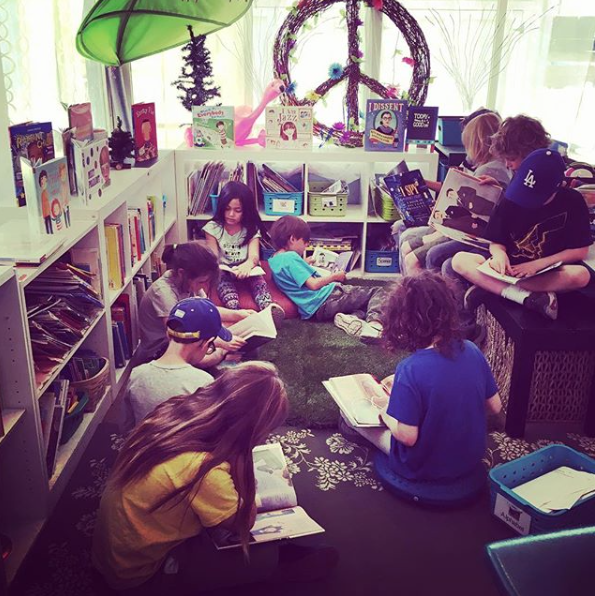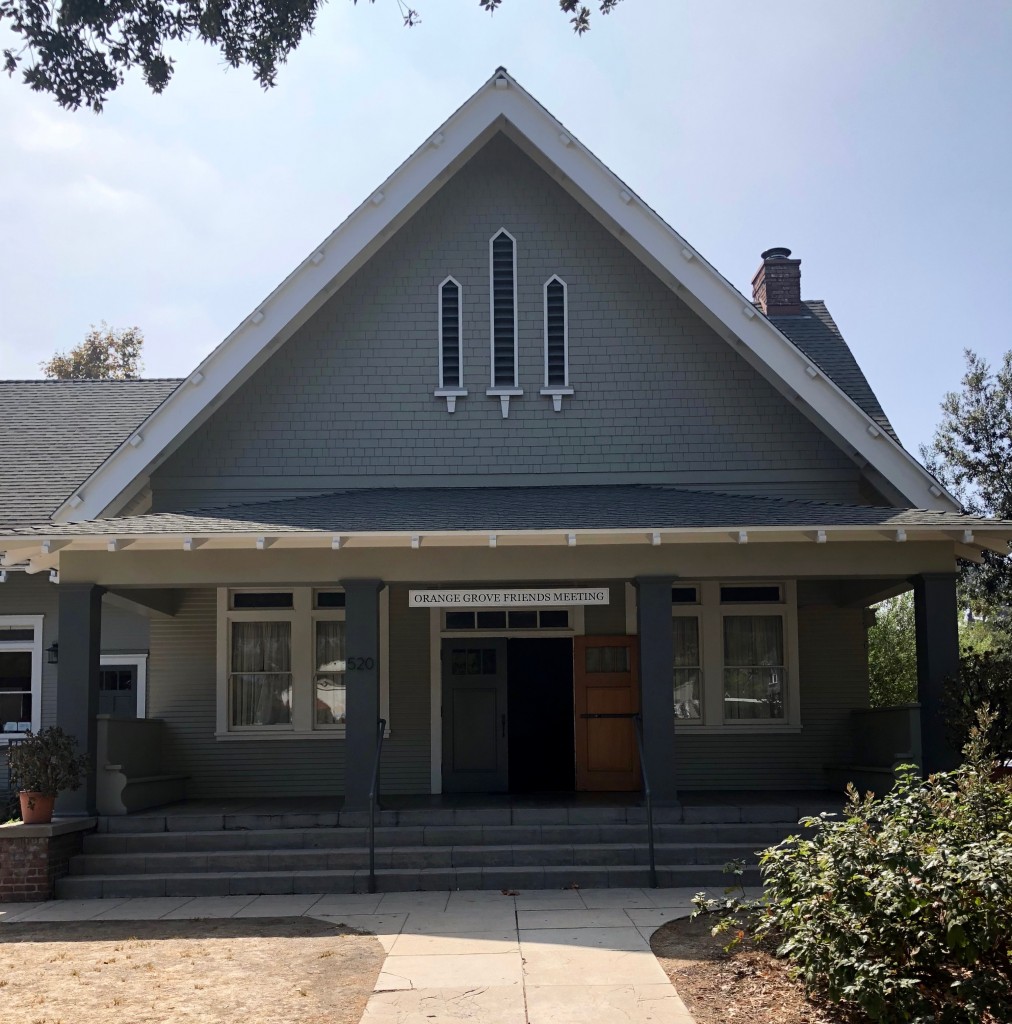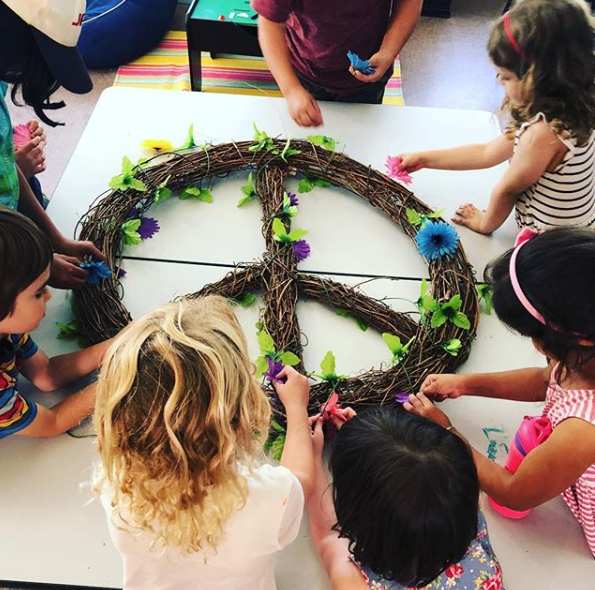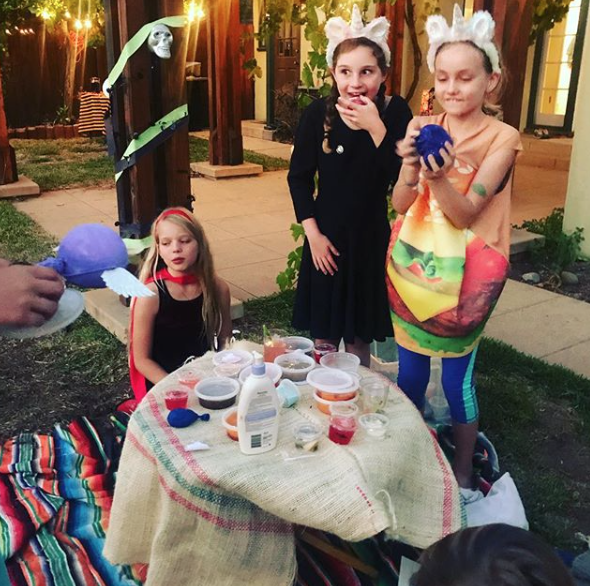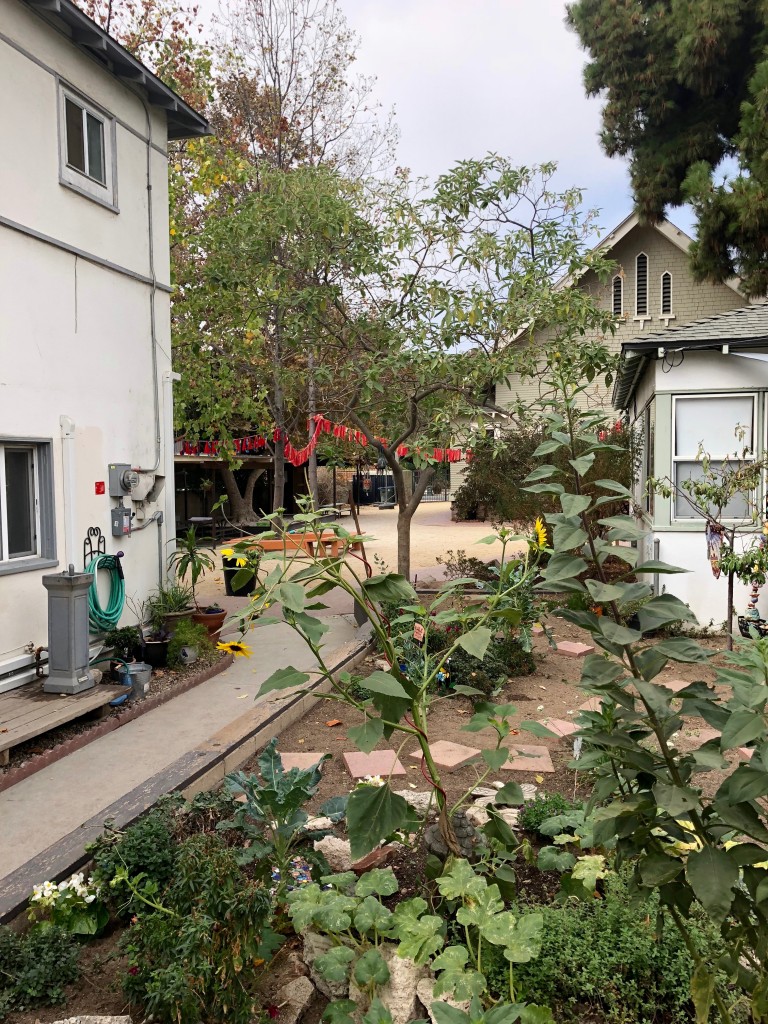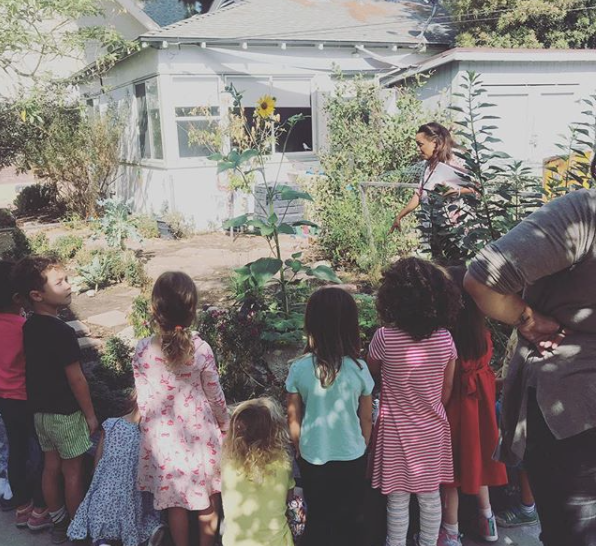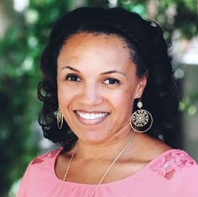
I recently toured Friends Western School in Pasadena, spending a morning with the leadership of this small, very unique Transitional Kindergarten-5th school. Below is my Q&A with Leilani Brooks, dean of students at Friends Western. Leilani holds a B.A. in Theater from UCLA with a focus on Arts Bridge Education. During 10 years at Disney, she performed in numerous stage shows and managed productions and events before transitioning into teaching. Leilani is outgoing and vibrant with a passion for creativity and a love of kids and teaching. I also met parents and teachers at the school who, along with the kids, were gracious and proud to show visitors their school.–Christina
Q: Friends Western School is truly one-of-a-kind because although it was founded in 2001, in 2010 it became the very first parent-run cooperative and the first Quaker co-op in the U.S. Can you talk a bit about how the co-op works on a given day, week or month? What role do parents play and how are decisions made?
A: While the faculty at Friends Western School are all highly qualified, experienced teachers, parents play important roles in the support and administration of the school. Parents work on committees to oversee things like admissions, marketing, and community life.
On a daily basis, parents will take playground shifts during lunch and recess, or be a chaperone on a field trip or hike. (Parents who can’t participate in co-op work, have an option each term to buy out of those duties.) This involvement in the daily life of the school creates a rich sense of community among both parents and children.
Parents also serve on the Board of Directors, which helps guide the school. Some decisions are made by the Board, others are voted on by the entire school in our monthly membership meetings. Decisions about the classroom, however, are made by faculty.
There are a few other cooperative elementaries in the US, but we are the only one in the Los Angeles area. Being part of the school is being part of a small but vibrant community, and the experience stays with students long after they leave.
Q: How would you describe the unique educational philosophy of the school?
A: We believe in the ‘whole child’ approach to education. Although all of our curriculum fulfills the common core standards, our highly educated teachers and small class size allows our staff to create a thematic curriculum that ties in all aspects of learning into a hands on, dynamic experience for our kids. Teachers incorporate Math, Science, and Language Arts into each unit of study, and extend the learning even further with hikes and field trips, to give our students a completely dynamic experience. For example, a unit on Southern California History will include the following excursions: 1) A docent led trip to the Autry museum, 2) a hike through Monrovia Canyon led by a ranger who explains how the Chumash that once lived on this land built their homes and foraged for food, 3) a trip to the The Stunt Ranch Santa Monica Mountains Reserve, which is a 310-acre biological field station located in the Santa Monica Mountains and is composed of chaparral, coast live oak woodland, riparian, and annual grassland habitats, to learn about the landscape and how it has evolved. Students also visit Wishtoyo Village, the last native Chumash village, and spend the night in a traditional Chumash “ap” or hut. Students learned how to cook with acorn flour, used by the native peoples of this region, and culminated their unit by creating a Chumash festival for the school which included Chumash games, rituals (such as face painting) and food.
In addition to teaching the common core standards, we spend time every day on conflict resolution, social emotional growth, and building a student’s sense of integrity and inner strength. We also make time each week for the arts, including theater, music, visual arts and movement. Finally, we are committed to a small school and small classrooms, as this allows our faculty to tailor the academics to the needs of each child, so that children can succeed at their own pace. Classrooms are comprised of two mixed grades, allowing the children to work at their ability level rather than their age. Students spend 2 years with each teacher, allowing the teacher to deeply understand each child’s learning style and emotional development.
Q: What kinds of families attend Friends Western? What qualities do you look for in applicant families?
A: A co-op school is NOT for everyone. We look for families that want to be part of their child’s education. We recognize that many families today work during school hours, and may need to buy out of some co-op duties. However, all families commit to attending monthly membership meetings and helping out to the best of their abilities. We want families who, when faced with a problem, will work to help solve the problem rather than wait for others to fix it. We actively seek a diverse membership, and have a need blind admissions process with robust financial aid.
Q: Friends Western is a member of the Friends Council on Education and is part of a rich heritage that includes Bryn Mawr College, Swarthmore College, Cornell University and Sidwell Friends (the Obama daughters’ school), among others. Can you explain the hallmarks of Quaker/Friends Schools?
A: Quaker schools are well known on the East Coast for providing excellent education with an eye toward social justice. At Friends Western, we don’t teach religion in the classroom, but we follow core Quaker values like Equality, Justice, Peace and Community.
Like many Quaker schools, each week begins in the Quaker meeting house where our kids sit in silent contemplation of a weekly “query.” The queries relate to issues students might face- how be a good friend, how to negotiate conflict on the playground, or what are fun activities to do that don’t cost money.
The Quakers believe in listening to “that of god” in everyone. At Friends Western, we interpret that to mean that every child has a unique and important perspective. We focus on listening deeply to each other, and empower our students to take an active role in their education.
Finally, we strongly believe in the Quaker value of service. Through the course of the year, every grade partakes in age appropriate “service learning.” This might include visiting a local senior center, raising money for charities, or participating in environmental cleanups.
Q: Friends Western classes are small by design. How does class size and student teacher ratio help enrich a student’s experience?
A: Research shows that students in small classes perform better in all areas of academics, and are also more engaged in learning because they have more time to participate in class. These findings show that it’s not just about student teacher ratio, but literally about the number of kids in a classroom.
At Friends Western, there are fewer than 15 kids in any classroom with an experienced teacher (only 7 kids in TK). Our small class size allows for highly individualized learning and support. It makes it easier for teachers to get creative and find new ways to engage and excite students. And it allows even the shyest students a chance to fully participate and find their voice. Small class size is the number one reason why parents choose Friends Western, and maintaining it is a top priority for our school.
Q: Graduates of Friends Western matriculate to a variety of public and private schools like Waverley, Gooden, Immaculate Heart, Renaissance Arts Academy and Blair Middle/High School. How do you prepare students for the transition to secondary school?
A: At Friends Western, we try to blend the best of progressive and traditional education. Our teachers use an emergent curriculum, drawing on kids’ natural curiosity with project based learning. But we teach the California state standards for academics, and teachers individually assess kids at the beginning and end of every year. Starting in third grade, students are given limited, engaging homework that grows in amount as they get older. By the time they matriculate, students have learned how to take responsibility for nightly assignments, and have been taught the same academics as their peers in traditional schools. While they can compete academically, we believe that Friends Western graduates carry with them a strong sense of integrity and inner strength, which helps them succeed in whatever school they choose.
For more information, visit www.friendswesternschool.org and check out the school’s gorgeous Instagram!
Photos: #1, 2, 4, 5, 7, 8 Friends Western School
Follow Beyond The Brochure on Facebook for the latest Los Angeles private school news and events! You can get a copy of Beyond The Brochure: An Insider’s Guide To Private Elementary Schools In Los Angeles on Amazon.
